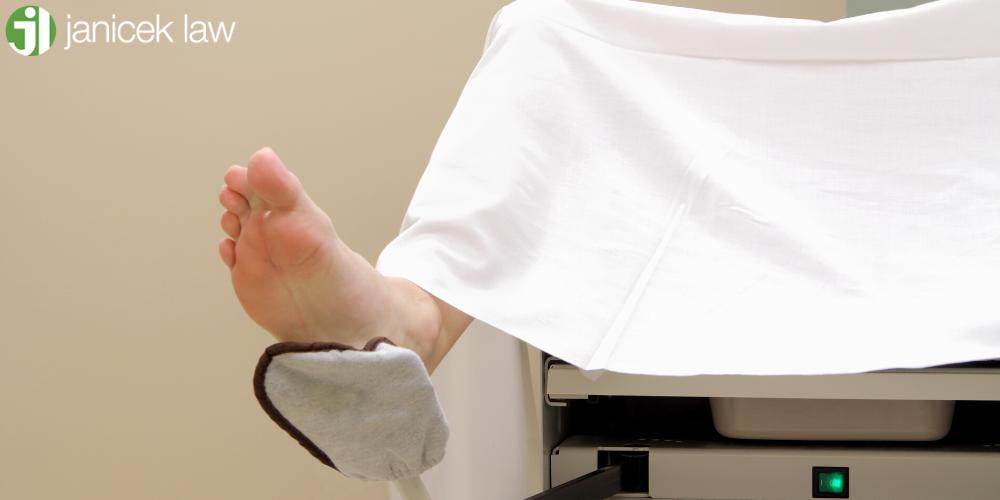San Antonio Doctor Sexual Abuse Lawyer
Doctor sexual abuse occurs when a medical professional engages in inappropriate behavior with a patient for the sake of sexual gratification. Tragically, sexual misconduct in doctor’s offices occurs more often than we think. Many victims suffer silently with post traumatic stress disorder (PTSD) and pure confusion after the abuse, because after all, some types of medical treatment are naturally invasive and uncomfortable. So, many patients who were sexually assaulted by their doctors never speak up because they’re not sure if what they experienced was a normal and necessary part of their medical care. Below, our legal team explains common examples of doctor sexual abuse, what is okay and what isn’t okay during invasive exams, and whether or not you can file a civil lawsuit against your doctor.
If you have been sexually abused by a doctor, therapist, clergy member, Boy Scouts leader, teacher, or anyone else, you may have grounds to pursue compensation through a civil lawsuit. Call San Antonio sexual abuse lawyers at Janicek Law at 210-366-4949 to schedule a free consultation today.

What is Doctor Sexual Abuse?
Doctor sexual abuse occurs when any sort of medical professional engages in sexual misconduct before, during, or after providing medical care. Most of the time, the victims are young women, but men can be victims too. Depending on the type of medical care you’re receiving, it can be very confusing to determine what is considered sexual abuse and what isn’t. Below, we list some common examples of sexual abuse in a medical setting:
- Touching intimate body parts without gloves.
- Touching intimate body parts during an appointment that doesn’t involve examination of intimate body parts.
- Encouraging or pressuring patients to fully undress during appointments that don’t require undressing. For example, if you’re seeing a health care professional about a broken ankle, you have no reason to get undressed.
- Encouraging or pressuring patients to undergo an invasive physical examination for no reason.
- Placing hidden cameras in exam rooms and bathrooms in order to watch patients undress.
- Enticing women or men to provide sexual favors for addictive drugs.
- Engaging in oral sex during an appointment.
- Making sexually suggestive comments before, during, or after an appointment.
- Making sexually suggestive gestures before, during, or after an appointment.
- Contacting a patient via text, email, or phone call with the intent of beginning a sexual or romantic relationship.
- Engaging in or attempting rape during an appointment.
- Committing fertility fraud, which is the failure of a fertility doctor to obtain a woman’s consent before artificial insemination or donor egg transfer.
If you have suffered any of the aforementioned examples of sexual assault by your medical professional, you may have grounds to take legal action.
The Larry Nassar Sexual Abuse Case
The Larry Nassar sexual abuse case is one of the most well-known doctor sexual abuse cases in recent U.S. history.
Larry Nassar is a convicted sex offender and, formerly, a sports medicine doctor of the USA gymnastics team for nearly 20 years. He was convicted of numerous federal charges for sexually abusing more than 500 female patients throughout the course of his career.
His scandal within the USA gymnastics arose in 2015 when numerous female patients claimed that Nassar had sexually assaulted them during what he would refer to as “normal and necessary medical exams.” More specifically, he would insert an ungloved finger into the vagina during physical therapy, for what he claimed was a necessary “pressure point” for pain relief. Other women claimed he would even do this when their parents were in the room with them, but in a way that the parents couldn’t see what he was doing. There are countless similar allegations from some of America’s most famous gymnasts including Simone Biles, Maggie Nichols, and McKayla Maroney.
In the end, Larry Nassar pleaded guilty to countless federal charges including possession of child pornography, tampering with evidence, seven counts of rape of minors, and three counts of rape. He is facing life imprisonment without the possibility of parole.
The Larry Nassar case is a tragic example of committing sexual assault under the guise of normal, necessary medical treatment. All of his victims felt afraid, violated, and uncomfortable during their appointments with him, but most waited years to speak up due to confusion about what is considered normal in a medical setting and what isn’t.
What You Should Expect From a Doctor in a Medical Setting
You should always feel comfortable and safe at the doctor’s office, no matter the health condition or body part being examined. Listed below are your basic rights that you should receive from every medical professional and every medical facility.
If you feel uncomfortable or you’re experiencing too much pain during any physical exam, you can tell the doctor to stop and they should stop.
If you feel more comfortable and safe with a partner, parent, friend, or other family member in the exam room with you, then you have a right to ask for this.
Physical exams can be naturally invasive, especially if you’re experiencing health problems with intimate body parts. Still, you deserve some level of privacy from medical professionals during these exams. You should be in a private room or you should be surrounded by a curtain. You also deserve a private room to undress and redress for physical exams.
Some physical exams require you to undress in some way. But you only need to undress the part of your body that is about to be examined. Additionally, you have the right to redress immediately after the exam so that you’re not exposed for longer than you need to be.
If you feel more comfortable with a doctor of a specific gender, you can ask for that, especially if you’re undergoing some sort of invasive examination.
Some exams are invasive and require the doctor to touch you in certain ways. You are allowed to ask questions during your exam about what the doctor is doing, seeing, and touching. They should answer you with legitimate medical reasons for why they’re doing what they’re doing.
If you’re wearing specific garments or pieces of jewelry that have religious purposes, you have the right to keep them on unless they interfere with an exam or treatment.
Obviously, not all doctors know how to speak multiple languages. But doctors should make an effort to speak to you in a way you understand, whether this means bringing in a bilingual doctor or having a loved one translate for you.
It is not uncommon for female patients, especially, to be told that their pain is not real or not as bad as they’re saying it is. This is especially common during IUD insertion procedures or colposcopies, where women often do not receive anesthetics and pain medications and therefore endure excruciating pain. You have the right to ask for anesthesia or pain medication. Additionally, if you’re in too much pain during an exam or treatment, you can ask the doctor to stop and they should stop immediately.

What is Okay For a Doctor to Do During a Physical Exam?
Everyone needs to undergo examinations of their breasts, vaginas, pelvises, rectums, or testes on occasion. These exams can naturally be very uncomfortable for patients, even if the doctor is completely professional at all times. It can also be difficult for patients to know what is okay for physicians to do during these exams, and what is not okay.
This is what is okay for a doctor to do during a breast, vaginal, teste, pelvic, or rectal exam:
- Walk you through each step of the exam before and during the exam so that you can feel as in control and comfortable as possible.
- Use gloves during the entirety of the exam.
- Tell you to let them know if something feels uncomfortable or painful during the exam.
- Stop the exam if you have asked them to stop for whatever reason.
- Ask you to undress only the part of the body that needs to be undressed for the exam.
- Bring in a new doctor for the exam if you ask for one.
- Allow you to have a loved one in the room during the exam if you have asked for that.
What is Not Okay for a Doctor to Do During a Physical Exam?
This is what is not okay for a doctor to do during a breast, vaginal, teste, pelvic, or rectal exam:
- Refuse to explain to you what they’re doing – and why they’re doing it – before or during the exam.
- Refuse to answer your questions before and during the exam.
- Tell you to be quiet if you’re asking questions before or during the exam.
- Touch your intimate body parts without gloves on.
- Prevent a loved one from being in the exam room with you despite your request.
- Encourage or pressure you to undress parts of your body that aren’t being examined
- Touch other parts of your body that aren’t supposed to be examined.
- Make sexual remarks, noises, or gestures while you’re being examined.
- Give you inappropriate compliments about your body before, during, or after the exam.
- Ask you invasive, unrelated, or unnecessary questions about your sexual activity during your exam.
- Make you feel uncomfortable or unsafe in any way during your exam.
If you have experienced any of these situations at a doctor’s office, you have grounds to report the doctor, contact the police, and contact a San Antonio sexual abuse lawyer at Janicek Law.
What To Do After Doctor Sexual Abuse
Physicians who have a history of sexually abusing their patients should not be practicing medicine. If you believe you have been sexually assaulted in a medical setting, this is what you should do:
- Contact local law enforcement and tell them what happened. Even if the police fail to take action, you will have a record of the doctor’s behavior.
- Contact the doctor’s office, hospital, or clinic and inform them of what happened. Again, even if nothing is done, you will create a record of the abuse.
- Report the doctor to your state’s medical board. The medical board will investigate your claim, and the doctor, and hopefully revoke their medical license.
- Call the National Sexual Assault Hotline at 800-656-4673 or chat online if you need extra support during this time.
- Call a San Antonio sexual abuse lawyer at Janicek Law. We will investigate your claim, defend your legal rights, and help you obtain justice and compensation for your sexual assault.
Damages for Doctor Sexual Abuse
Our team of San Antonio sexual abuse lawyers can help victims recover financial compensation for the following types of damages:
- Past and future medical expenses from health issues and hospitalizations related to your sexual trauma
- Physical pain and suffering
- Emotional distress
- Lost wages if your sexual trauma causes you to miss work
- Loss of earning capacity if your sexual trauma or mental disorder(s) prevent you from completing your normal job duties
- Loss of consortium if your sexual trauma prevents you from having a normal emotional and sexual relationship with your spouse
Texas Statute of Limitations for Sexual Abuse Claims
Because of the emotionally traumatic and confusing nature of sexual abuse, Texas has recently expanded its statute of limitations for sexual abuse claims so that victims have more time to speak up and seek justice.
Texas laws (HB 3809) now give victims of child sexual abuse 30 years from their 18th birthday to file a civil lawsuit against their sexual abuser. In other words, child sexual abuse victims have until their 48th birthday to file a lawsuit if they so choose. Meanwhile, adult victims of sexual abuse have 5 years from the day of their abuse to file a civil lawsuit in the state of Texas.
It’s important to note that the statute of limitations for civil and criminal claims differ in the state of Texas. If you’re unsure of your specific deadline for filing a lawsuit, be sure to contact a legal professional at Janicek Law.

San Antonio Physician Sexual Abuse Lawyer
If you were sexually abused by a doctor, nurse, physical therapist, or any other medical professional, you have grounds to file a civil lawsuit in the state of Texas. The legal team at Janicek Law will provide compassionate and strong legal counsel during this impossible time in your life. We want to ensure that you receive justice and financial compensation for your sexual trauma while also ensuring that the doctor never has the opportunity to violate another patient again. Call 210-366-4949 to schedule a free consultation at our law firm today.
